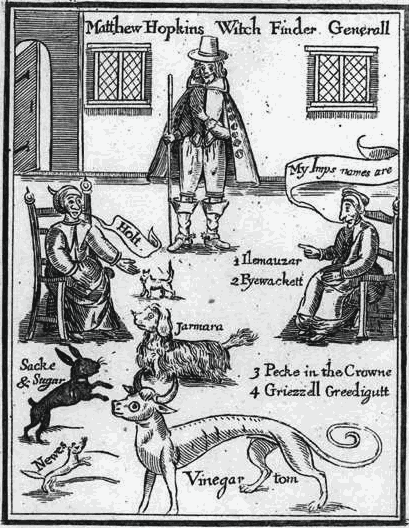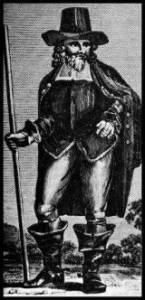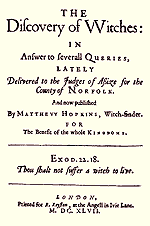My next book features Matthew Hopkins, the self proclaimed Witchfinder General as the main baddie. While researching the last six months or so I’ve read an awful lot about this conman, serial killer and utter shitbag. I’d like to share some of his story because it is fascinating and totally horrific (and you like that sort of thing).
For some context, he was “witch-finding” for only about three years between 1644-1647. He did it in East Anglia in England and he was only in his mid-twenties when he died (sadly, of natural causes… probably). Why is he so infamous? Well, in those three years he was responsible for the deaths of perhaps 300 women. We might expect there were loads of people executed for witchcraft back then but in fact there were perhaps 500 in total for all of England over 350 years and Hopkins did 300 of those in just three years and in one area.
Opposition to his activities was slow on the uptake, what with there being a civil war on and everything but eventually enough people questioned his methods that he knocked it all on the head, after making a good bit of cash from his activities. But to defend himself he published a book, or a long pamphlet, really, where he addresses these accusations one by one. I am reading it again now in order to pull out a few more turns of phrase to include in his dialogue. I am struck once again by just how much of an uptight, preening little prick he was. But also the level of creativity in his deranged fantasies is incredible; see the bizarre detail of the witches’ familiars… I’ll link to the full text of the book below but I just have to share some specific ones:
His answer to “Query no.4” explains how he started out finding witches in the first place and is well worth sharing in full because it gets ever more astonishing:
The Discoverer [talking about himself in the third person] never travelled far for it, but in March 1644 he had some seven or eight of that horrible sect of Witches living in the Towne where he lived, a Towne in Essex called Maningtree, with divers other adjacent Witches of other towns, who every six weeks in the night (being alwayes on the Friday night) had their meeting close by his house and had their severall solemne sacrifices there offered to the Devill, one of which this discoverer heard speaking to her Imps one night, and bid them goe to another Witch, who was thereupon apprehended, and searched, by women who had for many yeares knowne the Devills marks, and found to have three teats about her, which honest women have not: so upon command from the Justicethey were to keep her from sleep two or three nights, expecting in that time to see her familiars, which the fourth night she called in by their severall names, and told them what shapes, a quarter of an houre before they came in, there being ten of us in the roome, the first she called was
1. Holt, who came in like a white kitling.
2. Jarmara, who came in like a fat Spaniel without any legs at all, she said she kept him fat, for she clapt her hand on her belly and said he suckt good blood from her body.
3. Vinegar Tom, who was like a long-legg’d Greyhound, with an head like an Oxe, with a long taile and broad eyes, who when this discoverer spoke to, and bade him goe to the place provided for him and his Angels, immediately transformed himselfe into the shape of a child of foure yeeres old without a head, and gave halfe a dozen turnes about the house, and vanished at the doore.
4. Sack and Sugar, like a black Rabbet.
5. Newes, like a Polcat. All these vanished away in a little time. Immediately after this Witch confessed severall other Witches, from whom she had her Imps, and named to divers women where their marks were, the number of their Marks, and Imps, and Imps names, as Elemanzer, Pyewacket, Peckin the Crown, Grizzel, Greedigut, &c. which no mortall could invent; and upon their searches the same Markes were found, the same number, and in the same place, and the like confessions from them of the same Imps, (though they knew not that we were told before) and so peached one another thereabouts that joyned together in the like damnable practise that in our Hundred in Essex, 29. were condemned at once, 4. brought 25. Miles to be hanged, where this Discoverer lives, for sending the Devill like a Beare to kill him in his garden, so by seeing diverse of the mens Papps, and trying wayes with hundreds of them, he gained this experience, and for ought he knowes any man else may find them as well as he and his company, if they had the same skill and experience.
Terrifying that he could come up with all that and also be sure to include this line;
Imps names, as Elemanzer, Pyewacket, Peckin the Crown, Grizzel, Greedigut, &c. which no mortall could invent
The balls on this guy.
Many of the queries relate to specific methods he employed to get confessions from these women. In continental Europe, witches were persecuted by the church for heresy and often burned at the stake. But in England they were tried as ordinary criminals who had committed malicious acts and hanged. Torture was illegal in England at this time but Hopkins devised ways around it by committing torture in all but name. In the Discovery of Witches, Hopkins addresses the obvious criticisms of each technique and justifies its use.
They’d look for the devils mark (third nipple, skin tag or other blemish) by stripping them and searching their skin, often using pins to prick their skin all over looking for rough patches. Stripping people against their will is a very effective form of psychological torture (see Abu Ghraib). And the “witch-pricking” was clearly a means of inflicting sustained pain (“I was only looking for a secret tit, M’lud!”). There’s probably no one alive today that doesn’t have some blemish they’d claim as a devil’s mark (they’d take a patch of dry skin if there was nothing else) and this was an era before we had Nivea.
Another favoured technique was “walking up and down” which was by propelling the victim at incredible speeds for prolonged periods (the torturers would take turns and rest). This was to bring about exhaustion. Hopkins whines that it was “only to keepe them waking”. Which exposes perhaps the cruellest and most successful technique; sleep deprivation. Every torturer knows that withholding food, water and sleep will break a person and Hopkins was well into all that.
And they’d also be subjected to trial by water, the famous ducking stools and other methods of submerging someone in a pond or river (Hopkins’ euphemism was “Swimming”. We know all too well about waterboarding and what the sensation of drowning can do to someone.
Even in the 17th century, people knew that doing this stuff was bullshit, as evidenced by Query 11:
Oh! [note this exclamation put sarcastically into his accuser’s mouth] but if this torturing Witch-catcher can by all or any of these meanes [the torture methods] wring out a word or two of confession from any of these stupified, ignorant, unitelligible, poore silly creatures, (though none heare it but himselfe) he will adde and put her in feare to confesse telling her, else she shall be hanged; but if she doe, he will set her at liberty, and so put a word into her mouth, and make such a silly creature confesse she knowes not what.
Answer
He is of a better conscience, and for your better understanding of him, he doth thus uncase himselfe to all, add declares what confessions (though made by a Witch against her selfe) he allowes not of, and doth altogether account of no validity, or worthy of credence to be given to it, and ever did so account it, and ever likewise shall.
1. He utterly denyes that confession of a Witch to be of any validity, when it is drawn from her by any torture or violence whatsoever; although after watching, walking, or swimming, diverse have suffered, yet peradventure Magistrates with much care and diligence did solely and fully examine them after sleepe, and consideration sufficient.
2. He utterly denyes that confession of a Witch, which is drawn from her by flattery, viz. if you will confess you shall go home, you shall not go to the Goale, nor be hanged, &c.
3. He utterly denyes that confession of a Witch, when she confesseth any improbability, impossibility, as flying in the ayre, riding on a broom, &c. [quite remarkable, I think, that in 1647 he’s scoffing at the idea of witches flying on broomsticks]
4. He utterly denyes a confession of a Witch, when it is interrogated to her, and words put into her mouth, to be of any force or effect: as to say to a silly (yet Witch wicked enough) you have foure Imps have you not? She answers affirmatively, Yes:did they not suck you? Yes, saith she: Are not their names so, and so? Yes, saith shee; Did not you send such an Impe to kill my child? Yes saith she, this being all her confession after this manner, it is by him accompted nothing, and he earnestly doth desire that all Magistrates and Jurors would a little more then ever they did examine witnesses about the interrogated confessions.
In other words, they only accepted confessions once the women were utterly broken and willing to say anything.
Finally, he touches on one of the reasons he had for doing this to innocent women (who were most often poor widows on the edge of village society who were victims of local feuds. Most accusers were other women from the same village). Money. Query 14:
All that the witch-finder doth is to fleece the country of their money, and therefore rides and goes to townes to have imployment, and promiseth them faire promises, and it may be doth nothing for it, and possesseth many men that they have so many wizzards and so many witches in their towne, and so hartens them on to entertaine him.
Ans.
You doe him a great deale of wrong in every of these particulars. For, first,
1. He never went to any towne or place, but they rode, writ, or sent often for him, and were (for ought he knew) glad of him.
2. He is a man that doth disclaime that ever he detected a witch, or said, Thou art a witch; only after her tryall by search, and their owne confessions, he as others may judge.
3. Lastly, judge how he fleeceth the Country, and inriches himselfe, by considering the vast summe he takes of every towne, he demands but 20.s. a town, & doth sometimes ride 20. miles for that, & hath no more for all his charges thither and back again (& it may be stayes a weeke there) and finde there 3. or 4. witches, or if it be but one, cheap enough, and this is the great summe he takes to maintaine his Companie with 3. horses.
Which means, yeah I charge a lot but people ask me to help and I have huge expenses, man! Those witches ain’t gonna prick themselves.
It’s interesting to note that the first witch trials in New England only began the year after Hopkins’ book was published, and his techniques used in those and subsequent witch hunts including Salem. And we know that his family had connections there; in Matthew’s father’s will there is provision for Matthew’s brother Thomas to “send him over the seaes to such our frinds in Newe England” (assumed to be in Salem). However it came about, we do know Hopkins spread his insanity to a whole other continent after his death, through this book.
If you are interested in the full text it is really short and there’s a link below. I’ll leave it there but sign off with perhaps the most chilling bit, from the title page, this stark justification:
EXOD. 22.18.
Thou shalt not suffer a witch to live.
Some online Hopkins resources:
- The Wikipedia page is always a good place to start
- Essex Witch Trials is a fantastic website. Ignore the dated design, the content is killer. If you are interested in the subject, I cannot recommend it enough.
- Delve into an evil mind: The full text of the Discovery of Witches by Matthew Hopkins.




Wow, he does sound like a horrible person. He’ll make a frightening villain.